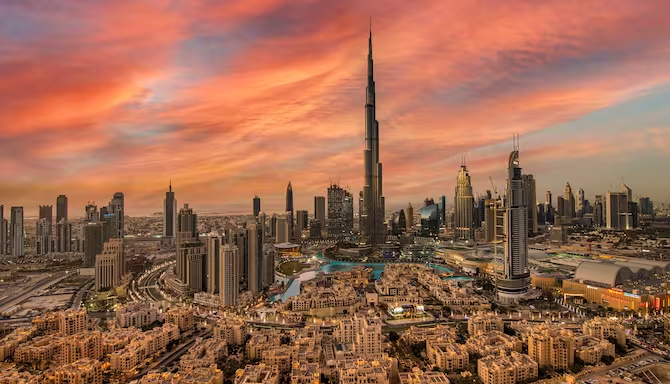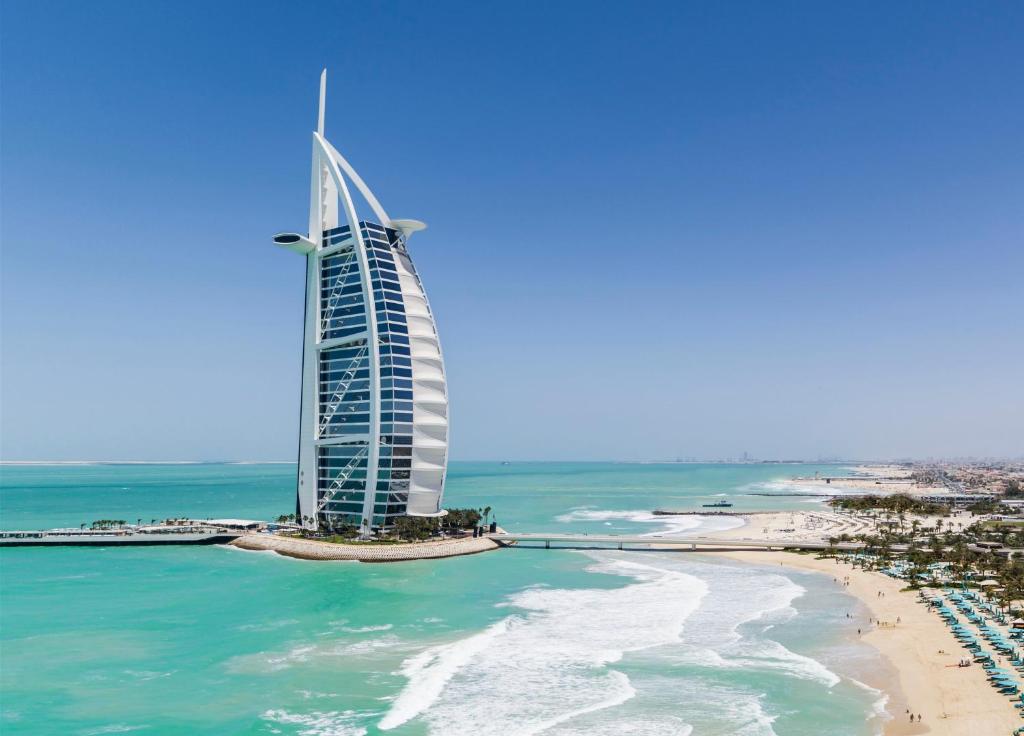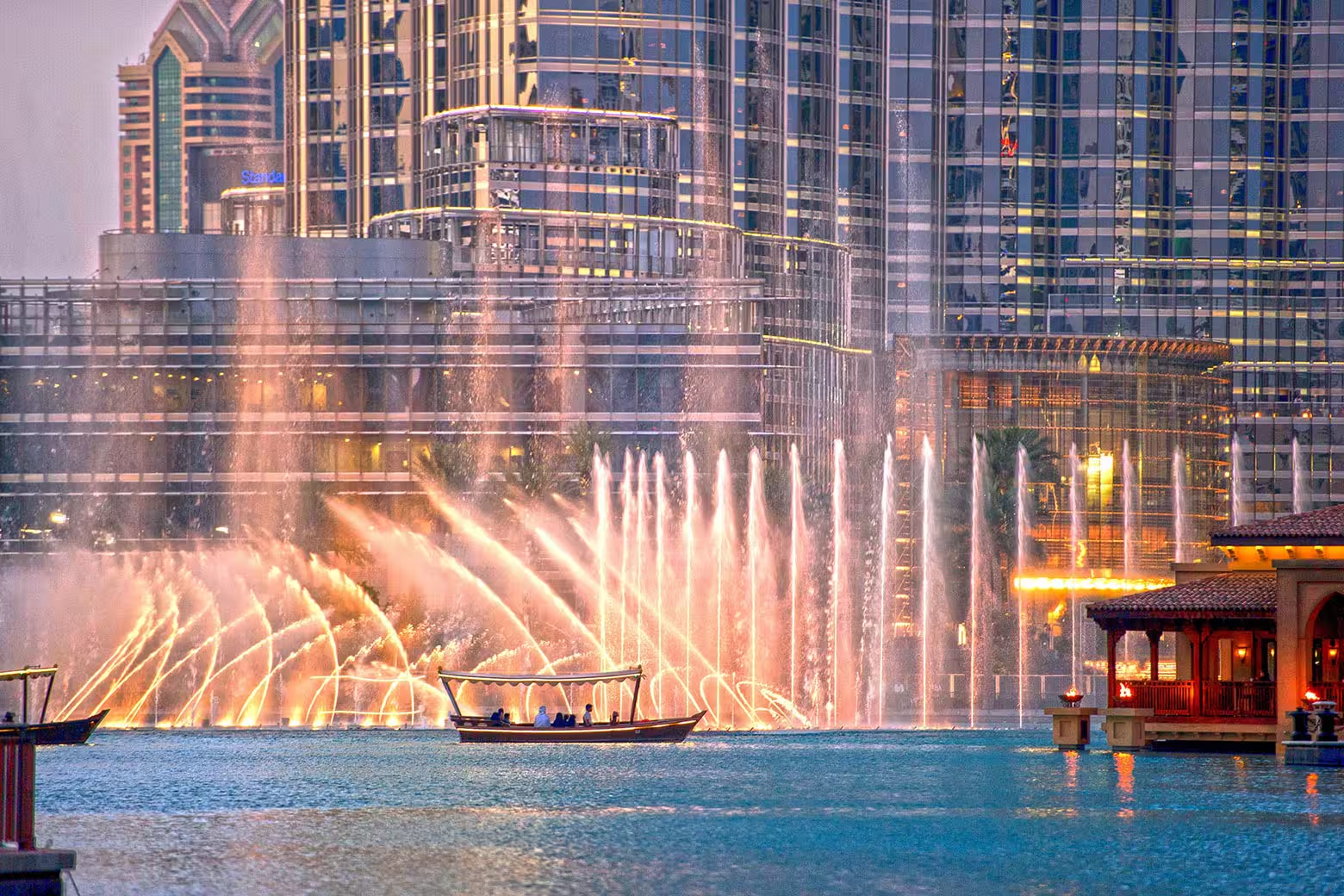CHAT
WITH US
WITH US
GET A
QUOTE
have questions? call us
+44 3330 907053

Blog • Asia • 11 Nov 2024
Share this article
Curious about what it's really like to live in Dubai? Wondering how to navigate the visa process or what the tax system would look like for you? If you're considering a move to the UAE from the UK, you've come to the right place. Over the years Deliver1 have moved countless people to their new lives overseas, along the way, we’ve answered several questions that might be on your mind. Because of this, we've put together a list of these answers to all those burning questions about life in Dubai.
Whether moving to Dubai is worth it depends on your personal circumstances and priorities. Dubai offers many benefits, such as tax-free salaries, a high standard of living, and a thriving expat community. However, it also has its downsides, such as the high cost of living, strict cultural norms, and extreme summer temperatures. Ultimately, it's a personal decision that requires careful consideration.
The cost of moving from the UK to Dubai varies depending on factors such as the volume of your belongings, your chosen shipping method, and any additional services you require. On average, shipping a 20-foot container from the UK to Dubai costs between £3,000 and £5,000, while air freight can cost upwards of £10,000. Don't forget to factor in additional expenses such as visas, housing deposits, and setting up utilities.
If you move to Dubai and become a non-resident of the UK for tax purposes, you will not be required to pay UK income tax on your Dubai earnings. However, you may still be liable for other types of UK tax, such as capital gains tax on UK property sales or inheritance tax. It's important to seek professional advice from a tax specialist to understand your specific tax obligations.

While Dubai is known for its high salaries and tax-free income, the cost of living can also be high, particularly when it comes to housing, education, and healthcare. In comparison, the UK has a higher tax rate but also offers free healthcare and education. Ultimately, the cost of living in Dubai versus the UK depends on your individual lifestyle and spending habits.
Salaries in Dubai vary widely depending on your industry, experience, and job role. However, as a general guide, a good monthly salary in Dubai is considered to be around AED 10,000 to AED 20,000 (approximately £2,000 to £4,000) for entry-level to mid-level positions, and AED 30,000+ (approximately £6,000+) for senior-level positions. Keep in mind that while salaries are tax-free, the cost of living in Dubai can be high.
While it is possible to move to Dubai without a job, it is not recommended. To obtain a residence visa in Dubai, you will need to be sponsored by an employer or have a valid reason for residency, such as starting a business or investing in property. It is much easier to secure a job before moving to Dubai, as this will ensure a smoother transition and provide you with a stable income.
British expats in Dubai tend to gravitate towards certain areas of the city, such as Dubai Marina, Jumeirah Beach Residence (JBR), The Palm Jumeirah, and Emirates Hills. These areas offer a high standard of living, with luxurious apartments and villas, stunning views, and easy access to amenities such as beaches, restaurants, and shopping malls. However, these areas also tend to have higher rental prices compared to other parts of the city.

Healthcare in Dubai is not free for expats. While Emirati nationals have access to free healthcare through government hospitals, expats are required to have private health insurance. Many employers in Dubai provide health insurance as part of their employee benefits package, but if not, you will need to purchase your own insurance. The cost of healthcare in Dubai can be high, so it's important to ensure you have adequate coverage.
To move to Dubai permanently from the UK, you will need to obtain a residence visa. The most common way to do this is through employment, with your employer sponsoring your visa. Alternatively, you can obtain a residence visa by investing in property, starting a business, or studying in Dubai. Once you have lived in Dubai for a certain period of time (usually 3-5 years), you may be eligible to apply for a long-term residence visa or even Dubai citizenship.
WhatsApp, along with other popular communication apps such as Skype and FaceTime, are not banned in Dubai. However, these apps may be subject to restrictions or limitations, particularly when it comes to voice and video calling. This is because the UAE's telecommunications companies, Etisalat and Du, want to encourage the use of their own calling services. Despite these restrictions, many expats in Dubai use WhatsApp and other apps without issue.
British citizens can visit Dubai without a visa for stays of up to 30 days. However, if you plan to live and work in Dubai, you will need to obtain a residence visa. This requires sponsorship from an employer or another valid reason for residency, such as studying or investing in property. Your British passport alone does not grant you the right to live in Dubai long-term.
The cost of rent in Dubai varies widely depending on the location, size, and type of property. On average, a one-bedroom apartment in Dubai can cost anywhere from AED 3,000 to AED 10,000 per month (approximately £600 to £2,000), while a three-bedroom villa can cost upwards of AED 10,000 to AED 20,000 per month (approximately £2,000 to £4,000). Keep in mind that many rental properties in Dubai also require additional fees, such as security deposits and maintenance fees.
Alcohol consumption is legal in Dubai for non-Muslims over the age of 21, but it is heavily regulated. Alcohol can only be purchased and consumed in licensed establishments, such as hotels, restaurants, and bars. It is illegal to drink alcohol in public places or to be under the influence of alcohol in public. As a resident of Dubai, you can also obtain a liquor licence which allows you to purchase alcohol for home consumption.
One of the biggest attractions of living in Dubai is the tax-free salary. Dubai does not impose income tax on individuals, so you can keep your entire salary without any deductions. However, it's important to note that while there is no income tax, there are other fees and charges that you may be required to pay, such as housing fees, utility fees, and VAT on certain goods and services.
While Dubai offers many opportunities for expats, it's important to note that permanent settlement can be difficult. Dubai does not offer a clear path to permanent residency or citizenship for expats, regardless of how long you have lived in the country. Most expats in Dubai are on temporary residence visas that are tied to their employment or other valid reasons for residency. However, in recent years, Dubai has introduced new visa options that allow for longer-term residency, such as the 5-year and 10-year visas for investors and entrepreneurs.
Dubai is known for its welcoming and diverse expat community, which can make settling in easier than in some other destinations. Many expats find that they are able to quickly build a social network and feel at home in Dubai. However, the process of settling in can still take time and may require some adjustment, particularly when it comes to navigating cultural differences and adapting to the local way of life. Joining expat groups and clubs, as well as making an effort to learn about Emirati culture and customs, can help to smooth the transition.
While Dubai offers many benefits, there are also some potential downsides to consider. These include the high cost of living, particularly when it comes to housing and education, as well as the strict cultural norms and laws that may take some getting used to. The extreme summer temperatures can also be a challenge, with temperatures often reaching over 40°C (104°F). Additionally, some expats may find the lack of permanent residency options and the transient nature of the expat community to be a drawback.
Whether relocating to Dubai is worth it depends on your individual circumstances and priorities. For many expats, the tax-free salaries, high standard of living, and exciting lifestyle opportunities make Dubai an attractive destination. However, it's important to weigh these benefits against the potential downsides, such as the high cost of living, strict cultural norms, and lack of permanent residency options. Ultimately, the decision to relocate to Dubai is a personal one that requires careful consideration and planning.
Salaries for British expats in Dubai can vary widely depending on factors such as industry, job role, and level of experience. According to a recent survey by HSBC, the average salary for British expats in the UAE (which includes Dubai) is around £81,000 per year, which is significantly higher than the average salary in the UK. However, it's important to keep in mind that the cost of living in Dubai is also higher than in the UK, particularly when it comes to housing, education, and healthcare.

The amount of money you need to live comfortably in Dubai depends on your individual lifestyle and spending habits. As a general guide, a monthly salary of around AED 10,000 to AED 20,000 (approximately £2,000 to £4,000) is considered sufficient for a single person to live comfortably in Dubai, while a family of four may require a monthly salary of AED 25,000 to AED 40,000 (approximately £5,000 to £8,000) or more. Keep in mind that this does not include additional expenses such as school fees, which can be a significant cost for expat families.
A salary of AED 40,000 per month (approximately £8,000) is considered a good salary in Dubai, particularly for a single person or a couple without children. This salary would allow for a comfortable lifestyle, with the ability to afford a nice apartment or villa, dine out regularly, and enjoy the many leisure and entertainment options that Dubai has to offer. However, for a family with children, a salary of AED 40,000 may be stretched thin, particularly if you factor in the high cost of education and healthcare.
The job market in Dubai can be competitive, particularly in certain industries such as finance, technology, and hospitality. However, there are also many opportunities for skilled professionals, particularly those with experience in high-demand fields such as healthcare, education, and engineering. To increase your chances of finding a job in Dubai, it's important to have a strong CV and to network actively with other professionals in your industry. Many expats also find success by working with recruitment agencies that specialise in placing international candidates.
Moving to Dubai from the UK can be an exciting and rewarding experience, but it's important to do your research and plan carefully to ensure a smooth transition. If you're considering a move to Dubai and need assistance with shipping your belongings, Deliver1 can help. With our expert international removals services, we can handle every aspect of your move, from packing and shipping to customs clearance and delivery. Contact us today or get a free quote using the link below to learn more about how we can support your relocation to Dubai.
We love hearing from you-so please get in touch with any questions or queries.
We love hearing from you-so please get in touch with any questions or queries.
Working hours
Mon - Sat: 08:00 - 17:00
Sun: Closed
Call
+44 3330 907053Location
Unit 3, Newyears Green Lane
Newyears Green
Uxbridge
UB9 6LX
United Kingdom
